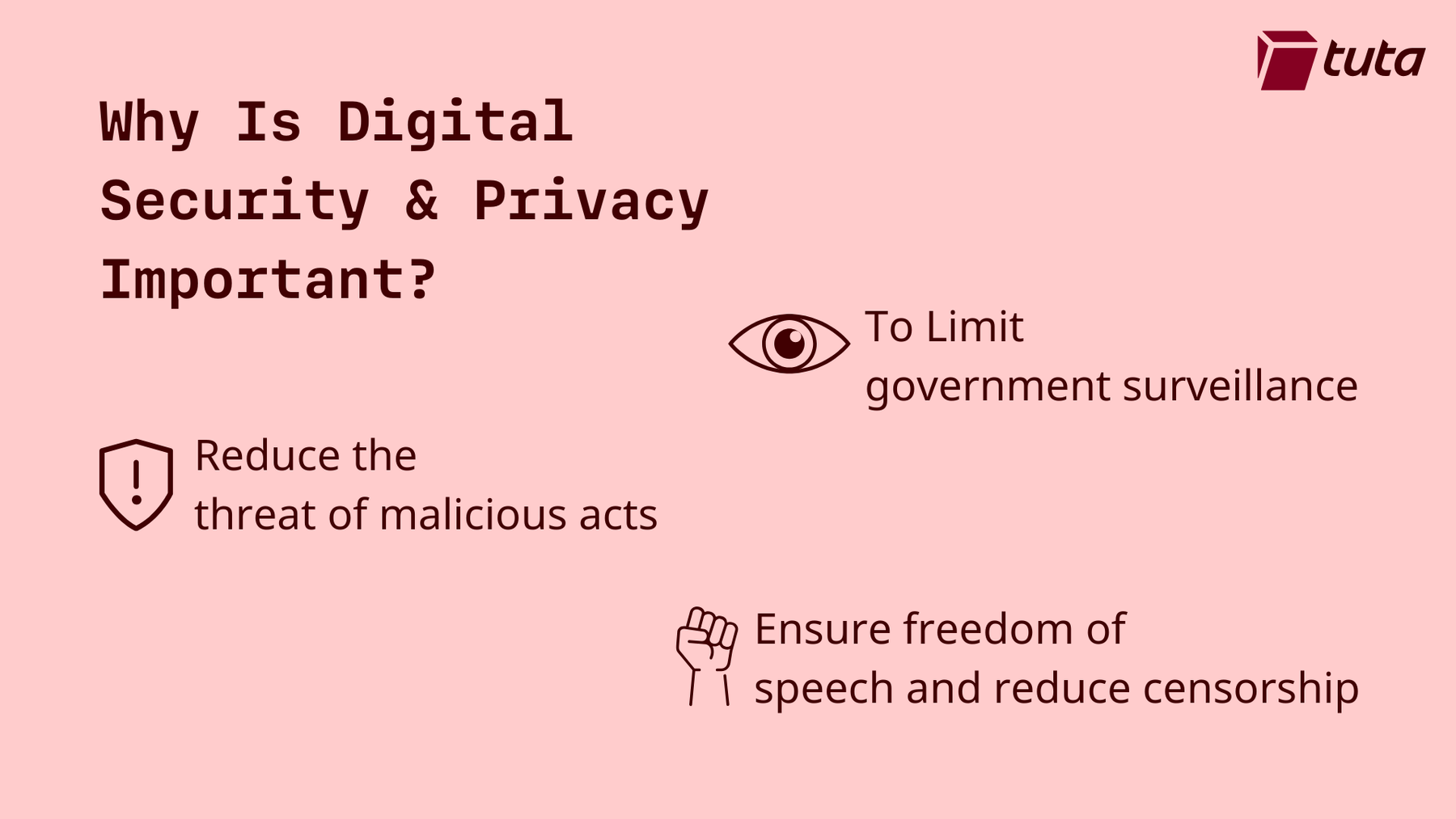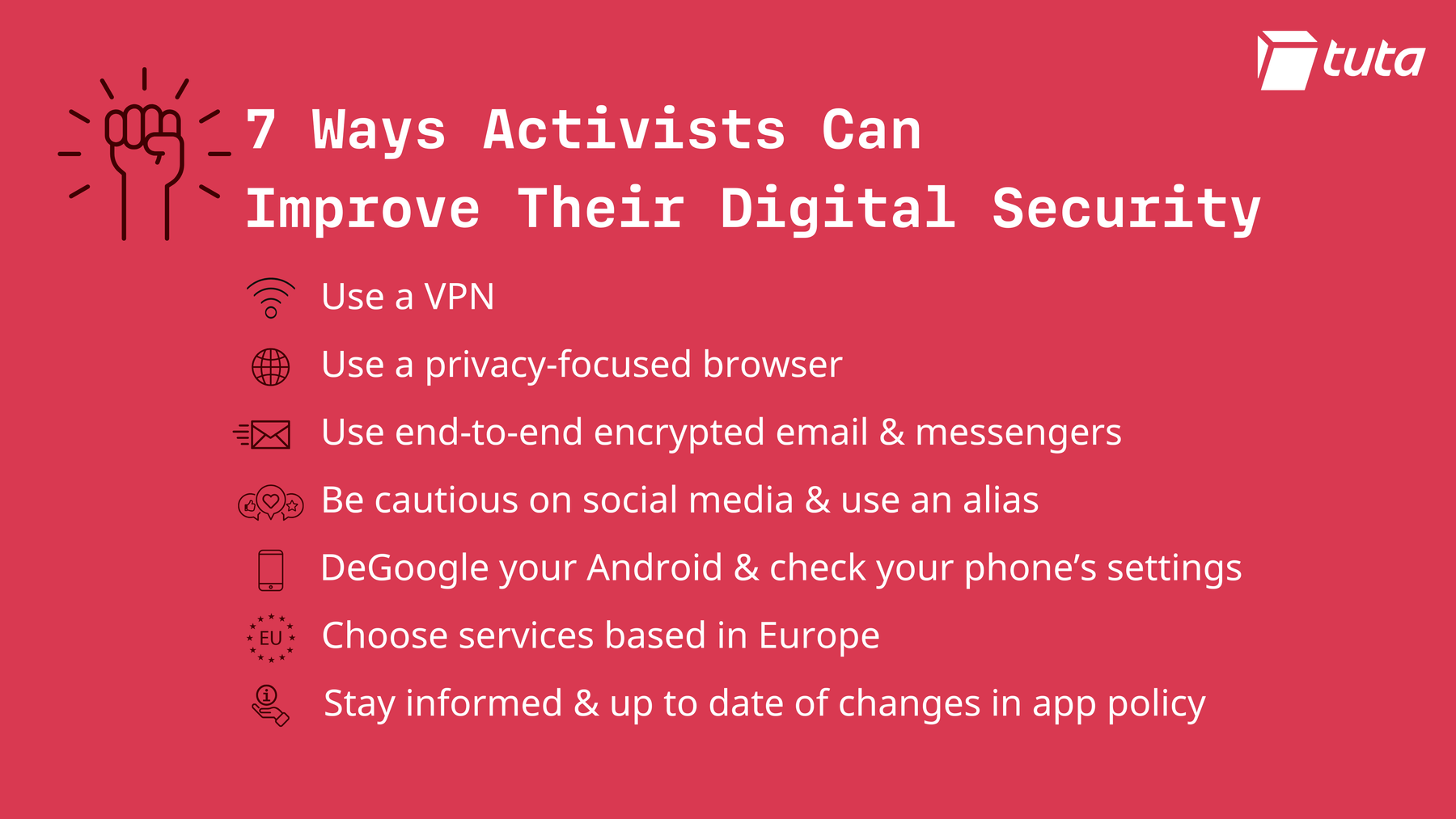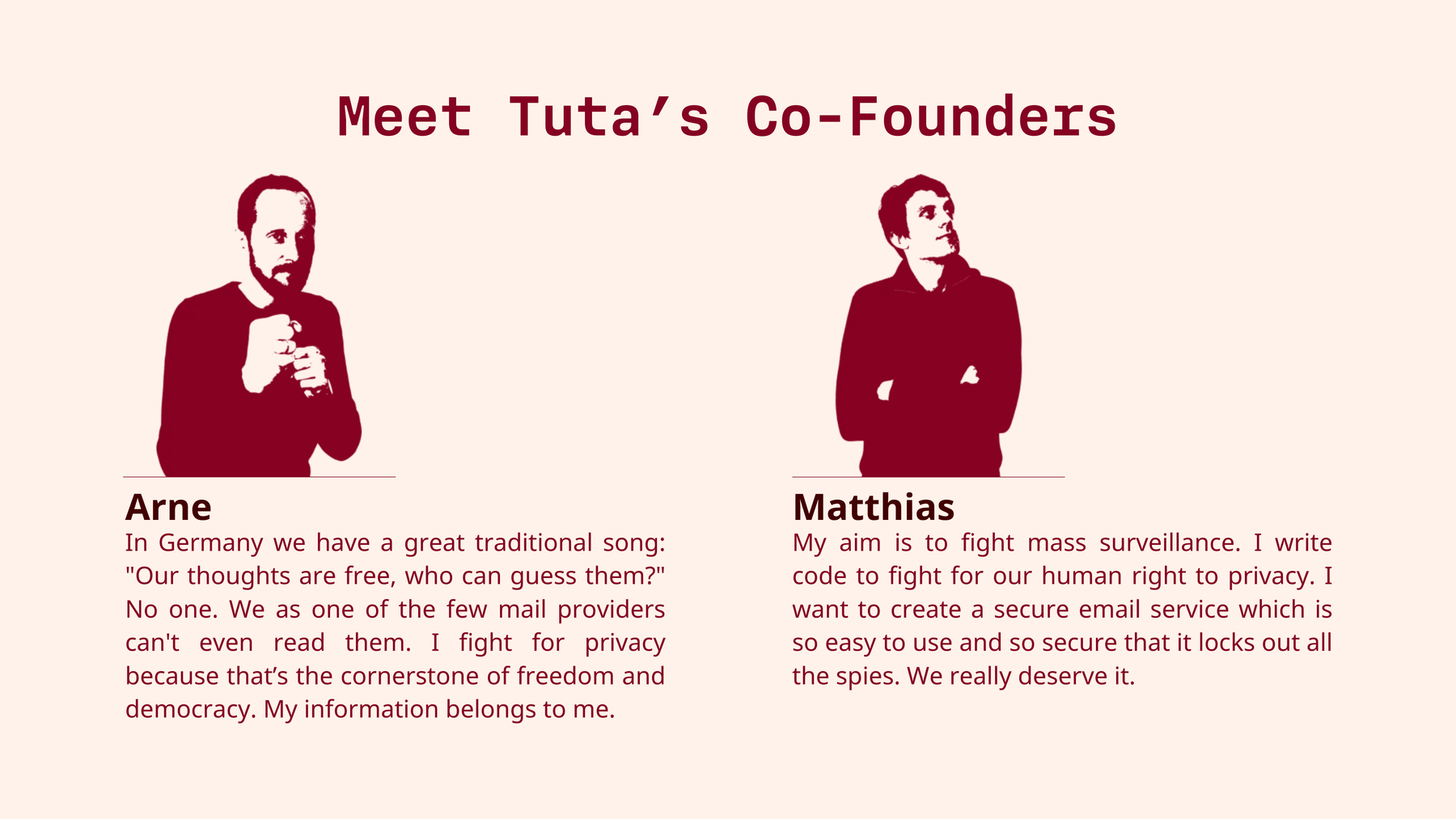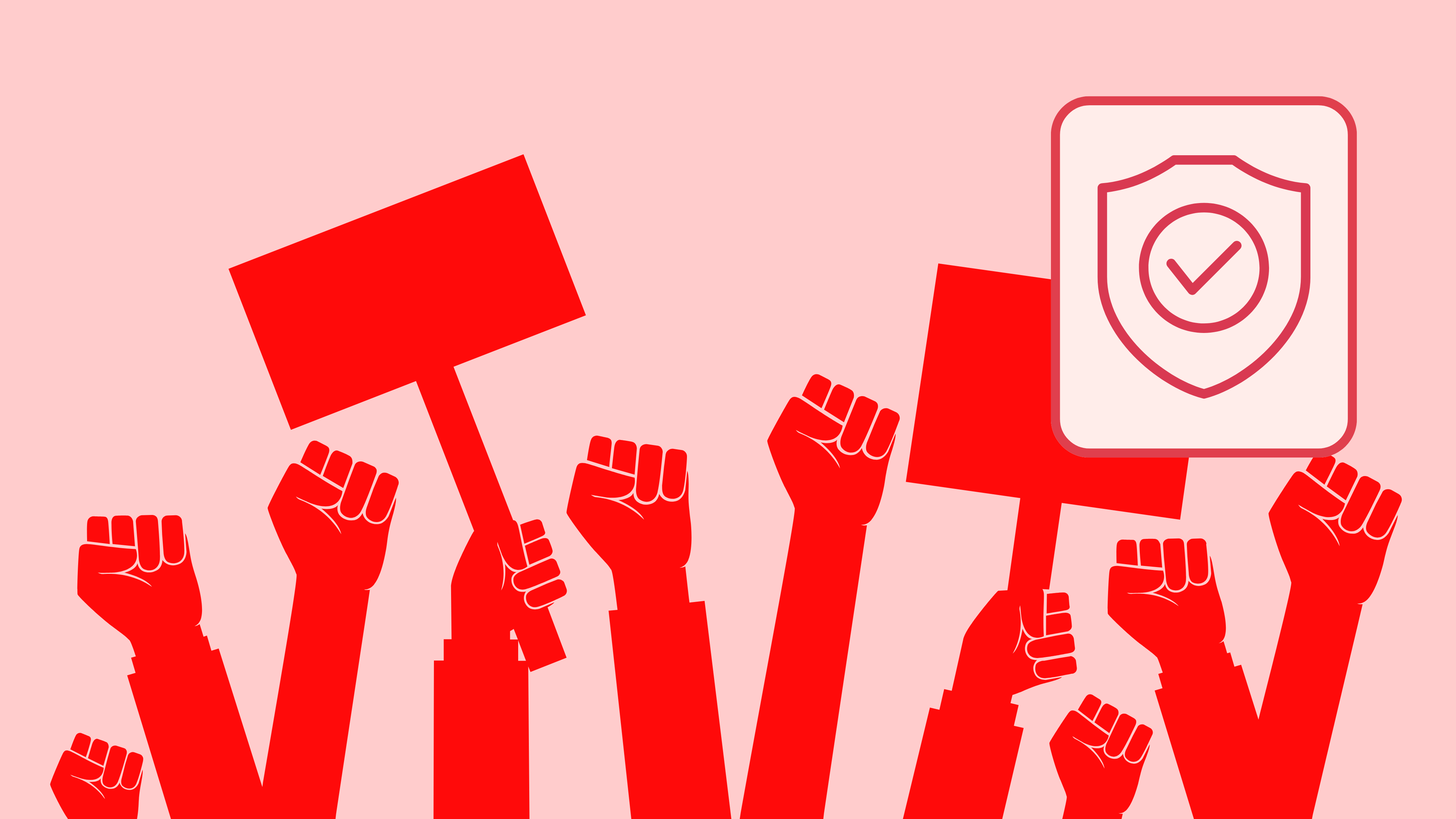Цифровая безопасность для активистов: Как защитить себя
Активисты подвергаются высокому риску слежки в Интернете. Узнайте у экспертов Tuta по защите частной жизни, как повысить свою цифровую безопасность.
Сегодня активизм опирается на цифровую сферу. Чтобы активисты были услышаны и имели право голоса, они должны быть онлайн. Начиная с движения Black Lives Matter и заканчивая движением Me Too, мы видим, что присутствие в сети играет важную роль в создании перемен, распространении информации и, конечно, позволяет людям объединяться и сплачиваться.
К сожалению, такая зависимость от цифрового мира сопряжена с большим риском, тем более что большинство сервисов, которыми пользуются люди, принадлежат пяти крупным технологическим компаниям. Эти технологические гиганты наживаются на наших данных, имеют слишком тесные связи с правительством и политическими режимами и знают о нас слишком много благодаря инвазивной слежке.
Цифровой мир может быть опасен для обычного человека, но еще более опасен он для борцов за свободу, меньшинств и активистов, борющихся за перемены. Связанные с этим риски более распространены в виде правительственной слежки, угроз со стороны противоборствующих групп и злоумышленников.
Команда экспертов Tuta, являющаяся компанией, которая предлагает активистам и НПО зашифрованную электронную почту, делится своими соображениями о том, как активисты могут повысить свою цифровую безопасность и почему цифровая конфиденциальность так важна в 2025 году для всех, но еще более важна для активистов.
Прежде чем перейти к деталям, важно помнить, что цифровое присутствие человека никогда не может быть на 100% безопасным и приватным. К сожалению, безопасность и конфиденциальность в Интернете чрезвычайно сложны и постоянно меняются, причем со скоростью, за которой трудно угнаться. Но мы можем предпринять активные шаги для повышения своей цифровой безопасности, внеся некоторые изменения. Цель этой статьи - просветить и проинформировать активистов о том, как они могут улучшить свою цифровую безопасность.
Разные движения - все онлайн
Активистская деятельность все чаще переходит в онлайн по многим причинам. Без присутствия в сети многие активисты не были бы услышаны, а движения не получили бы такого большого распространения. Цифровое пространство, безусловно, необходимо для распространения информации, позволяет меньшинствам высказаться, а активистам - объединиться. И хотя все движения разные, объединяет их одно: сегодня им необходимо присутствие в Интернете.
Платформы социальных сетей позволяют единомышленникам объединяться и создавать группы, а активистам - распространять информацию. Такие платформы, как электронная почта или мессенджеры, позволяют группам объединяться, организовываться и делиться ресурсами.
Важность цифровой конфиденциальности и безопасности для активистов


Цифровая безопасность и конфиденциальность необходимы не только активистам, но и всем, чтобы ограничить слежку со стороны государства, снизить угрозу злонамеренных действий и обеспечить свободу слова.
Мы знаем, что цифровое присутствие жизненно важно для активистов, организаций и групп меньшинств, но, к сожалению, цифровой мир представляет собой обоюдоострый меч, особенно для активистов, которые подвергаются повышенному риску слежки и нарушения неприкосновенности частной жизни.
Сервисы, на которые мы часто полагаемся, часто принадлежат крупным технологическим компаниям, таким как Meta (Facebook, WhatApp), Alphabet (Google) или Microsoft (Outlook). Эти компании практикуют онлайн-слежку, отслеживая каждый наш шаг, продавая наши данные и часто имея очень тесные связи с политическими организациями. Кроме того, технологические гиганты могут легко внедрять новые технологии (слежки) и в любое время обновлять условия использования или политику конфиденциальности в свою пользу. Отличным примером этого является LinkedIn, которая спокойно соглашается на использование данных своих пользователей для обучения искусственному интеллекту, не спрашивая их прямого согласия. Другой пример - Apple, отменившая облачное шифрование для британских пользователей из-за давления со стороны правительства Великобритании. Поскольку крупные технологические компании обычно не публикуют свой код с открытым исходным кодом, им еще проще изменить его или внедрить бэкдоры для слежки.
По этим причинам важно иметь надежные меры по защите цифровой конфиденциальности и пользоваться надежными сервисами в Интернете:
- Ограничить государственную слежку
- Снизить угрозу вредоносных действий
- Обеспечить свободу слова и снизить цензуру.
Государственная слежка - это норма
Активисты, которые присутствуют в социальных сетях, находятся в поле зрения общественности, борются с политическими режимами или открыто выступают против позиции правительства, больше рискуют стать объектом правительственной слежки. Степень слежки также зависит от вашего географического положения. Для активистов в странах, известных тем, что притесняют граждан и заставляют их молчать, сбор информации в Интернете может иметь опасные последствия.
Не только Россия и Китай подавляют свободу слова и практикуют жесткую слежку. Правительственная слежка стала нормой. От покупки ФБР информации о пользователях до законопроекта FISA: В США слежка, похоже, не имеет границ.
Известно, что брокеры данных продают информацию о гражданах тем, кто больше заплатит - АНБ и ФБР. Кроме того, Закон о надзоре за иностранной разведкой FISA позволяет вести слежку без ордера. Раздел 702 закона FISA затрагивает не только граждан США, но и всех людей во всем мире, поскольку дает американским властям право шпионить за иностранцами. Эти примеры еще раз подтверждают, что при наличии власти и денег ваши онлайн-данные могут попасть в руки кого угодно.
Слежка по-прежнему преобладает в странах, которые, как известно, защищают частную жизнь пользователей!
Европейский союз известен тем, что защищает данные граждан с помощью Общего регламента по защите данных (GDPR). Этот регламент помогает обеспечить защиту данных - особенно от таких технологических гигантов, как Google и Microsoft. Но GDPR недостаточно. В ЕС некоторые страны пытаются добиться введения контроля над чатами, в то время как другие, например Германия, выступают против этого законопроекта. Если законопроект будет принят, провайдеры чатов и электронной почты должны будут проверять каждое сообщение на наличие материалов о сексуальном насилии над детьми (CSAM), включая зашифрованные сообщения. Это подорвет конфиденциальность, гарантируемую шифрованием, и может привести к массовой слежке.
На момент написания этой статьи в ЕС сквозное шифрование соблюдается и поддерживается, потому что все знают, что оно необходимо для защиты данных. Но, как показывает опыт борьбы за контроль над чатом, при смене политических программ ничто не является само собой разумеющимся и все может быстро измениться. Вот почему мы должны продолжать бороться за право каждого человека на конфиденциальность. И мы в Tuta намерены это делать!
То, что законно сейчас, может измениться в будущем
Массовая слежка за власть имущими не является чем-то новым, и история показывает ее разрушительные последствия для общества. В этом можно убедиться снова и снова, если обратиться к прошлому. Для компании, базирующейся в Германии, сложная история этой страны является прекрасным примером. В 1920-х годах гомосексуальность не была принята в Германии так, как сегодня, но к ней относились терпимо, и людям не приходилось опасаться за свою жизнь, если они становились гомосексуалами. К сожалению, все изменилось к худшему. С приходом к власти Гитлера в Германии началась новая эра массовой слежки, и сексуальная ориентация человека могла внезапно стать причиной отправки в концлагерь. Помните, что все это происходило до появления Интернета, поэтому пугает то, что теперь шпионаж, слежка и профилирование вас стали намного проще и быстрее для власть имущих, и это происходит так, что многие люди даже не замечают.
6 способов, с помощью которых активисты могут повысить уровень цифровой безопасности


Следуйте этим шагам, чтобы повысить свою цифровую безопасность.
Угроза 1: ваш интернет-провайдер (ISP)
Интернет-провайдеры могут шпионить за вашими действиями в сети. Они могут видеть информацию, которую вы заполняете на сайтах, домены и конкретные страницы, которые вы посещаете. Поэтому, если вы являетесь активистом, важно иметь средства защиты от шпионажа со стороны провайдеров.
Решение?
Чтобы избежать любых угроз, связанных со шпионажем провайдера, мы рекомендуем использовать VPN. Но помните: Использование VPN лишь смещает круг тех, кто может за вами шпионить: Теперь это не интернет-провайдер, а провайдер VPN. Поэтому для активистов мы рекомендуем использовать VPN, базирующийся не в вашей стране, так как в этом случае вашему правительству будет сложнее завладеть данными. VPN шифрует ваш интернет-трафик и скрывает ваш IP-адрес от провайдера.
Угроза 2: Ваш браузер и поисковая система
Браузер и поисковая система, которые вы выбираете, сильно влияют на вашу конфиденциальность. Google Chrome и Search - худшие браузеры для защиты конфиденциальности, потому что они получают огромную прибыль от ваших личных данных и не стремятся защитить вашу конфиденциальность перед лицом запросов правительства. В настоящее время этот технологический гигант владеет рынком и является поисковой системой по умолчанию на большинстве устройств - но это только потому, что Google платит миллиарды в год за то, чтобы быть поисковой системой по умолчанию. Несмотря на то что Google уже отслеживает пугающие объемы данных с помощью файлов cookie, теперь Google сделал еще один шаг вперед и ввел “цифровой отпечаток пальца” - гораздо более инвазивный метод слежения, который происходит беззвучно в фоновом режиме.
Решение?
Активисты должны полностью отказаться от Google, избегать браузера Chrome и поисковой системы. К счастью, существует множество браузеров и альтернативных поисковых систем, ориентированных на конфиденциальность, которые не следят за вами, блокируют назойливую рекламу по умолчанию и гарантируют, что ваша конфиденциальность будет соблюдена.
Ознакомиться с руководством команды Tuta по лучшим браузерам, ориентированным на конфиденциальность, вы можете здесь!
Угроза 3: Электронная почта и мессенджеры без сквозного шифрования
Без сквозного шифрования ваши электронные письма и сообщения могут быть прочитаны и доступны третьим лицам. Активисты, группы активистов или те, кто отправляет конфиденциальную информацию, должны общаться по каналам, которые по умолчанию шифруют все данные. При выборе платформы всегда учитывайте, где она расположена и кому принадлежит. Например, WhatsApp имеет сквозное шифрование, но принадлежит компании Meta, которая печально известна тем, что собирает данные пользователей. Например, Gmail - самая популярная платформа электронной почты, но она не предлагает сквозного шифрования, а в прошлом даже была замечена в сканировании содержимого почтовых ящиков для целевой рекламы. Оба этих крупных технологических сервиса базируются в США, так что если американские правоохранительные органы захотят получить ваши данные, они могут легко прекратить их сбор.
Решение?
Используйте только платформы с открытым исходным кодом и сквозным шифрованием для работы с электронной почтой и мессенджерами. Помимо того, что они должны быть с открытым исходным кодом и со сквозным шифрованием, выбирайте сервисы, которые базируются в ЕС или странах со строгими законами о защите данных.
Tuta Mail - отличный выбор для активистов и организаций, поскольку по умолчанию в нем используется квантово-безопасное шифрование. Она также имеет открытый исходный код и базируется в Германии. Прежде чем выбрать провайдера электронной почты с шифрованием, ознакомьтесь с этим подробным руководством по лучшим провайдерам частной почты.
Если говорить о платформах для обмена сообщениями, то существует множество отличных альтернатив WhatsApp, которые предоставляют вам все те же возможности, но со сквозным шифрованием и повышенной конфиденциальностью. Наш личный фаворит - Signal, но есть еще несколько отличных платформ, которые вы можете выбрать, когда речь идет о мессенджерах со сквозным шифрованием.
Угроза 4: Социальные сети
Социальные платформы играют огромную роль в активизме. Они служат местом для общения, объединения, распространения информации и позволяют движениям набирать обороты. Для вас как активиста присутствие на социальных платформах необходимо, но вы также должны знать о рисках конфиденциальности социальных профилей. Все действия активистов на социальных платформах должны быть осторожными.
Решение?
Существует множество крупных технологических социальных платформ, таких как Facebook и X, но сегодня появляются и более совершенные социальные платформы, такие как Mastodon или Bluesky, так что уход от платформ, принадлежащих крупным технологиям, вполне возможен.
Независимо от того, на каких платформах вы активны, мы рекомендуем всегда использовать псевдоним и никогда не публиковать никакой идентифицирующей информации о себе или знакомых вам людях. Всегда будьте осторожны с тем, что вы публикуете, комментируете и чем делитесь не только публично, но и через прямые сообщения - некоторые социальные платформы имеют доступ к сообщениям, которые вы отправляете друг другу в приложении, поэтому, если вы хотите переписываться, всегда выбирайте службу мессенджеров со сквозным шифрованием.
Угроза 5: ваше мобильное устройство
Ваше мобильное устройство - это как портативный маячок. Все, что мы делаем на телефоне, собирается, анализируется и отслеживается, и это усиливается каждый раз, когда мы устанавливаем новые приложения. Можно сказать, что лучший вариант - полностью отказаться от мобильного устройства. К сожалению, это решение непрактично и практически невозможно. По этой причине мы никогда не сможем быть по-настоящему приватными, пока у нас есть мобильные устройства, как и когда мы присутствуем в Интернете. Но, тем не менее, мы можем предпринять несколько простых шагов, чтобы повысить уровень безопасности и конфиденциальности при использовании мобильных устройств.
Решение
У вас, как у активиста, есть несколько вариантов повышения уровня конфиденциальности при использовании мобильного устройства. Все они зависят от типа вашего мобильного устройства, используемой операционной системы, а также от того, сколько времени и усилий вы готовы потратить на создание более конфиденциального устройства.
Если вы являетесь пользователем iOS, вы можете ознакомиться с этим руководством по основным советам по безопасности iPhone, чтобы лучше защитить свои данные.
Для пользователей Android есть несколько вариантов - лучшим вариантом будет установка кастомного ROM и полный отказ от ОС Android от Google. Если для вас это слишком сложно и технично, вам придется изменить множество настроек, чтобы остановить слежку и шпионаж Google. Ознакомьтесь с нашим руководством о том , какие настройки Android следует изменить для обеспечения большей конфиденциальности.
Как и платформы социальных сетей, мобильные операционные системы постоянно обновляются и меняют условия использования и политики конфиденциальности. Всегда обновляйте свой телефон до последней версии программного обеспечения, старайтесь быть в курсе новых настроек или приложений, которые появляются вместе с обновлением, а также изменений в политике, которые негативно влияют на вашу конфиденциальность. Например, если вы являетесь пользователем Android, вы должны удалить Android System Safety Core, который, как утверждает Google, призван повысить вашу конфиденциальность, но на самом деле является предшественником сканирования на стороне клиента.
Угроза 6: Юрисдикция
Прежде чем выбирать приложения и сервисы, которыми вы пользуетесь, следует подумать о том, где они расположены. Как уже говорилось, в США ФБР и АНБ покупают информацию о пользователях. Поэтому если компания базируется в США и держит там свои серверы - или в любой другой стране, входящей в альянс “Пяти глаз”, - то, возможно, в ней есть средства защиты конфиденциальности, но они могут быть быстро отменены властями.
Решение?
Выбирайте службы, расположенные на территории Европейского союза, поскольку они обязаны соблюдать GDPR. В ЕС ваша информация также лучше защищена, поскольку существуют более строгие меры, препятствующие доступу к ней властей.
Цифровая безопасность постоянно меняется и усложняется
В этом руководстве мы рассмотрели некоторые основы повышения цифровой безопасности активистов, и если вы дочитали до этого момента, то наверняка поняли, что цифровая безопасность и конфиденциальность - это сложная тема, которая меняется по первому требованию. Активисты, группы активистов и борцы за свободу имеют разные потребности и требования, поэтому не существует идеального решения или услуги, которая подходит всем.
Наши рекомендации значительно улучшат вашу цифровую безопасность, но вам все равно придется постоянно следить за используемыми сервисами. Всегда помните, что приложения постоянно продаются, меняют условия предоставления услуг и внедряют новые технологии, например искусственный интеллект. Поэтому стоит постоянно обновлять используемые приложения и сервисы, чтобы убедиться, что они по-прежнему хорошо подходят и защищают вашу конфиденциальность.
Электронная почта, календарь и диск со сквозным шифрованием с помощью Tuta
Если вы активист, представитель НПО, борец за свободу или человек, желающий повысить уровень безопасности и конфиденциальности в Интернете, вы пришли по адресу.
Tuta - это провайдер электронной почты, календаря, контактов и диска (скоро появится) со сквозным шифрованием, ориентированный на предоставление лучших безопасных и частных услуг, которые обеспечивают людям возможность общаться, планировать и организовывать свою работу в условиях конфиденциальности без угрозы слежки.
Tuta базируется в Германии, стране с одними из самых строгих законов о защите конфиденциальности данных. Это полностью открытый исходный код, созданный группой экспертов в области конфиденциальности со всего мира, которые разделяют общее убеждение: конфиденциальность - это право человека, которое должно быть защищено сквозным шифрованием.
Мы придаем большое значение нашей этике, тому, кто мы есть как компания, и тому, какие изменения мы хотим видеть в мире. Мы выступаем за разнообразие и не допускаем дискриминации. Мы также верим в ответственность за свои действия, поэтому мы являемся “зеленым” провайдером электронной почты и серьезно относимся к своей экологической ответственности. Наша этика и убеждения лежат в основе нашей деятельности, поэтому мы в Tuta не срезаем углы, подрывая безопасность, шифрование или ставя прибыль на первое место.
В Tuta мы активно боремся против слежки и авторитарного контроля, предлагая квантово-безопасные зашифрованные решения для всех.
Tuta говорит “нет” слежке и “да” свободе


Познакомьтесь с соучредителями компании Tuta, Арне и Маттиасом.
Конфиденциальность - это наша ДНК, и мы выполняем миссию по распространению конфиденциальности по всему миру. Для этого мы предлагаем бесплатные и платные тарифные планы Tuta всем желающим. Кроме того, мы поддерживаем некоммерческие организации, школы и проекты с открытым исходным кодом, жертвуя наши тарифные планы Tuta Business, гарантируя, что их хорошая работа будет выполняться в частном порядке.
Узнайте, как и почему Комитет за справедливость использует Tuta для обеспечения конфиденциальности и безопасности своих конфиденциальных сообщений.


